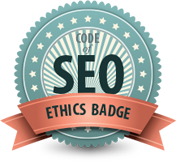Whereas all parties are working towards presenting relevant and high quality information in an easy to use format to information seekers, and whereas SEO practitioners are being contracted to assist clients in obtaining higher rankings for client pages, we voluntarily adhere to the below SEOToolSet® Code of Conduct as it relates to Search Engine Optimization:
No SEO practitioner will intentionally utilize practices that serve one set of content to the search engines, and a visually different set of content to other visitors. Ideally, ALL requests sent to a specific URL should be served identical content by the web server. Cloaking is not inherently evil, but using it to deceive a search engine is not acceptable. ALL text within the BODY section of an HTML page should be visible, uncovered and easily readable by all visitors to the page. Since the search engines determine the relevancy of a page for a keyword based in part on “visible content”, the search engine user deserves to see the same “visible” content when they click through to that page. Anything less than a substantial match between the content that the search engine spider sees and the content that the user sees is deception. The use of any technology with the intent to hide content or the importance of certain content from the user in any way is unacceptable. This includes using on-page techniques, bait-and-switch techniques, server controls and any other techniques developed to deceive either the search engines or search engine users. Simply put, certainly there are a great many ways to “hide” content, and all of them are deception and are not acceptable.
No SEO practitioner will intentionally use redirection in such a manner that search engines see one set of content, and non-search engine visitors are forwarded to and view a different set of content. Ideally, ALL requests sent to a specific URL should land on and remain on that URL. It is not acceptable to rapidly switch users to a page containing content other than the indexed content, commonly using redirects or event-driven processes.
No SEO practitioner will intentionally produce multiple pages with identical or nearly identical content for the purpose of influencing the search engines. Ideally, all site pages should be unique and contain content of value to a researcher seeking information. Obviously several sites can reprint articles, process news feeds, and sell the same products, but expert information is only expert if it is unique. It is not enriching to the user experience to have all of the top results containing rehashed versions of the same content.
No SEO practitioner will utilize software to automatically generate pages of no or limited value. Automatically-generated pages commonly have “gibberish” and usually make no grammatical or logical sense, hence they harm the user experience. It is generally understood that the generation of hundreds or thousands of indexable pages in an attempt to have them ranked is unacceptable. However, data base driven pages are also automatically created as are the search engine results themselves, so not all automatic pages are evil.
No SEO practitioner will intentionally participate in a Link Farm. No site can control who links to them. However your site does not need to participate in a program where unrelated sites will link to each other for the purpose of artificially inflating rankings. If the link is valid, then that is fine. If it is to deceive the search engines then it is not acceptable.
All SEO practitioners will work to their best ability to maintain the integrity of the search experience. We must all consider the effects of our optimization efforts on both the client’s rankings and the quality of the search engine results overall. If any optimization technique detracts from a search engine user’s experience, it is not worth using. After all, the goal of search engine optimization is not to simply achieve rankings, but it is to make expert information more accessible to users through search engine queries. Do not make pigs fly.
All SEO practitioners will work to their best ability to maintain the integrity of the SEO industry. All SEO practitioners must be committed to upholding ethical and professional conduct in practicing search engine optimization. This steadfast commitment will improve the SEO practitioner’s reputation as an honest, hard-working SEO professional. Plus, it will help the practitioner maintain honest, healthy relationships with their clients, the search engines, and other SEO professionals. This in turn will help improve the reputation of the SEO industry as a whole.
SEO Code Of Conduct Courtesy Bruce Clay, Inc.










